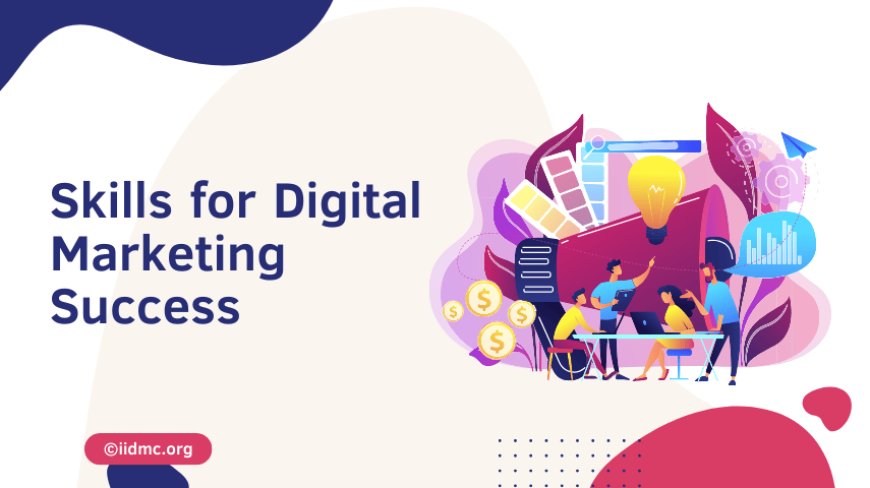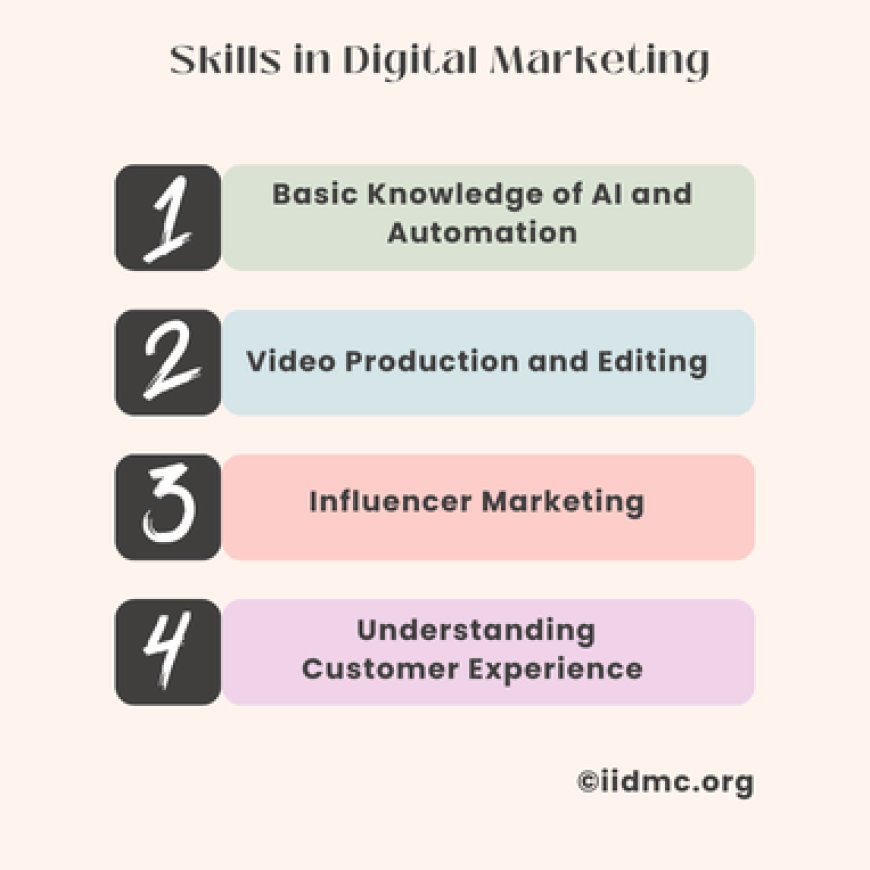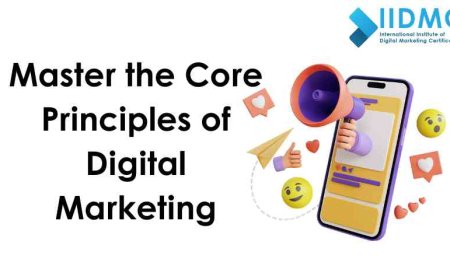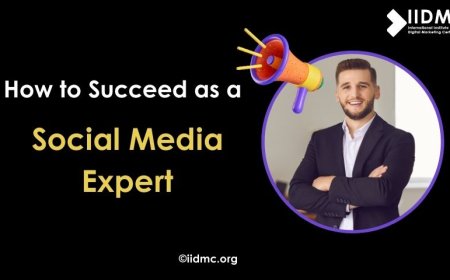Top Skills for Digital Marketing Success
Discover the top skills needed for digital marketing success, from SEO and content creation to analytics and social media strategy. Boost your career with these essential digital marketing skills!

In today’s fast-paced digital world, success in marketing goes beyond creativity alone—it requires a diverse set of specialized skills. As businesses and brands compete for attention online, digital marketers must master a blend of strategic, analytical, and technical expertise to make a real impact. Whether it’s optimizing for search engines, analyzing data trends, crafting compelling content, using social media effectively, these skills are essential for staying ahead. In this blog, we’ll dive into the top skills every digital marketer needs to succeed, equipping you with insights to navigate and excel in the ever-evolving world of digital marketing.
Core Technical Skills for Digital Marketing
-
SEO (Search Engine Optimization)
-
SEO is essential for increasing website visibility and driving organic traffic from search engines. By optimizing a website for search engines, marketers can improve its ranking on search engine results pages (SERPs), making it easier for potential customers to discover the business.
-
Key SEO skills include:
-
Keyword research: Identifying terms and phrases that target audiences are searching for.
-
On-page optimization: Crafting optimized titles, meta descriptions, headers, and content to align with search intent.
-
Link building: Building credible backlinks from reputable sites to enhance authority and rank.
-
To effectively manage SEO, marketers often use tools like Google Analytics and SEMrush to track performance, identify trends, and adjust strategies based on the latest algorithms. Staying updated on SEO trends is crucial, as search engine algorithms frequently change, impacting ranking factors and SEO best practices.
-
Content Marketing and Copywriting
-
Creating value-driven content is at the heart of engaging and converting audiences in digital marketing. Effective content not only captures attention but also addresses audience needs, building trust and encouraging action.
-
Key skills include:
-
Storytelling: Crafting narratives that resonate emotionally with the audience.
-
Persuasive writing: Using language to drive action while staying authentic.
-
Brand voice alignment: Ensuring content reflects the brand’s personality and message consistently.
-
Content marketers work with various formats—blogs, videos, infographics, and more—each with unique applications. Blogs, for instance, build SEO and provide in-depth insights, while videos engage visually and emotionally, making content more memorable.
-
Social Media Marketing
-
Managing and growing a social media presence requires a deep understanding of platform dynamics and audience behavior. Effective social media marketing fosters community, boosts brand awareness, and drives engagement.
-
Essential skills include:
-
Platform-specific content creation: Tailoring content to fit the style and format of each platform.
-
Audience engagement: Actively responding to comments, messages, and shares to build relationships.
-
Analytics interpretation: Using data to gauge content performance and optimize future strategies.
-
Social media marketers often leverage tools like Hootsuite and Buffer to schedule posts, track engagement, and streamline workflows, allowing them to stay organized while focusing on creative engagement strategies.
-
Data Analytics
-
Tracking and interpreting marketing data is crucial for making informed decisions and optimizing digital strategies. Data analytics allows marketers to understand what’s working, identify areas for improvement, and allocate resources effectively.
-
Key metrics include:
-
Engagement: Measures audience interaction with content.
-
Conversions: Tracks successful actions, like sign-ups or purchases.
-
ROI: Assesses the profitability of marketing efforts.
-
Essential tools like Google Analytics provide detailed insights, while data visualization practices help present findings clearly, making complex data easy to interpret and act upon.
-
Paid Advertising (PPC)
-
Pay-per-click (PPC) advertising is a fast way to drive targeted traffic by placing ads in front of specific audiences. Advertisers only pay when users click on their ads, making PPC a cost-effective strategy when managed well.
-
Key skills include:
-
Budget management: Allocating funds efficiently across campaigns.
-
Audience targeting: Reaching the right users through demographics, interests, and behaviors.
-
Ad optimization: Crafting ads for platforms like Google Ads and Facebook to maximize reach and relevance.
-
A/B testing is a common practice to compare ad versions, helping marketers refine their approach and boost ad performance by understanding which messages and formats resonate most with their audience.
Essential Soft Skills for Digital Marketing
-
Creativity and Innovation
-
Creativity is crucial in crafting unique and memorable marketing campaigns that stand out. Innovative thinking allows marketers to connect with audiences in new ways, leaving a lasting impression.
-
Tips for enhancing creativity include brainstorming with diverse teams, drawing inspiration from current trends, and exploring unconventional ideas. Content creation tools like Canva and Adobe Creative Suite can be useful for sparking and executing creative ideas.
-
Communication and Storytelling
-
Effective communication is essential for conveying brand messages clearly and engagingly across different channels. Strong storytelling brings brands to life, creating connections that resonate emotionally with audiences.
-
Tailoring messages to specific audience personas ensures relevancy and impact. Storytelling techniques like authentic narratives, relatable characters, and compelling visuals can help build a loyal following and deepen brand affinity.
-
Adaptability and Agility
-
The fast pace of digital marketing requires marketers to stay agile, quickly adopting new tools, platforms, and trends. Trends like TikTok, AI-driven content, and new social features demand rapid adaptation and creativity.
-
Developing a mindset of continuous learning and flexibility is key to staying current. Marketers can build adaptability by experimenting with emerging platforms, staying updated with industry news, and regularly refining their skills.
-
Strategic Thinking and Planning
-
A strategic approach is essential to ensure that marketing efforts align with broader business goals, maximizing impact and efficiency. Strategic thinking helps marketers prioritize actions, set clear goals, and develop a roadmap to reach them.
-
Key skills include:
-
Campaign planning: Crafting targeted campaigns that align with brand objectives.
-
Goal setting and KPI tracking: Measuring success with precise metrics.
-
Time management: Balancing multiple projects effectively to maintain momentum across campaigns.
-
Customer-Centric Focus
-
Understanding and addressing customer needs is fundamental for creating relevant and effective marketing. By identifying pain points, marketers can create tailored experiences that build loyalty and satisfaction.
-
Essential skills include:
-
Customer journey mapping to visualize and enhance the customer’s path.
-
Personalization and audience segmentation for targeted messaging.
-
Empathy: Developing a customer-focused perspective to craft meaningful, user-centric content that resonates deeply with the audience.
Skills in Digital Marketing

-
Basic Knowledge of AI and Automation
-
AI is rapidly transforming digital marketing, enabling advanced personalization and efficient automation. From chatbots providing real-time customer support to automated email marketing and AI-driven content creation, understanding these tools helps marketers reach audiences more effectively and at scale.
-
Familiarity with AI applications, such as chatbots for engagement, automated email workflows, and AI-based content tools, is becoming increasingly valuable.
-
Video Production and Editing
-
Video content continues to gain importance as audiences favor engaging visual content across platforms. Basic skills in video shooting, editing, and creating engaging, platform-optimized videos are now essential for digital marketers.
-
Tools like Adobe Premiere and iMovie, as well as mobile apps like InShot and KineMaster, make it easier to produce high-quality videos that capture audience attention.
-
Influencer Marketing
-
Collaborating with influencers can significantly expand reach and credibility, especially within specific niche markets. Marketers need skills in identifying suitable influencers, managing partnerships, and measuring ROI.
-
Important metrics include engagement rates, follower authenticity, and conversion tracking to ensure that influencer collaborations effectively contribute to brand goals. Understanding the influencer landscape helps marketers make data-driven, impactful choices in their partnerships.
4. Understanding Customer Experience (CX)
Customer Experience (CX) is crucial in shaping brand loyalty and driving customer retention. A positive CX fosters strong, lasting relationships with customers, leading to repeat business and increased advocacy. Brands that prioritize CX show customers they are valued, which builds trust and loyalty over time.
Key skills in CX include:
-
User experience (UX) research to understand customer needs and pain points.
-
Feedback collection through surveys, reviews, and direct communication to gain actionable insights.
-
Optimization of touchpoints across the customer journey to ensure a seamless experience.
CX metrics like Net Promoter Score (NPS) are useful for measuring customer satisfaction and loyalty, providing insights into how likely customers are to recommend a brand. Tracking these metrics allows brands to continuously improve and align with customer expectations.
To succeed in digital marketing, mastering a mix of core technical, soft, and emerging skills is essential. From SEO and content marketing to data analytics and customer experience, these skills form the foundation of effective marketing strategies. Soft skills like creativity, communication, and adaptability, combined with emerging expertise in AI, video production, and influencer marketing, equip marketers to thrive in this dynamic field.
In the fast-paced world of digital marketing, continuous learning and upskilling are crucial for staying relevant. The International Institute of Digital Marketing (IIDMC) encourages professionals to regularly assess and enhance their skills to stay competitive and achieve long-term career success. By embracing these essential skills and committing to lifelong learning, digital marketers can confidently navigate the evolving digital landscape and unlock new opportunities for growth.





























